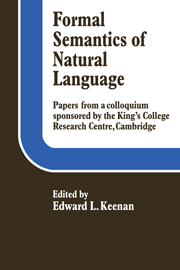Book contents
- Frontmatter
- Contents
- Notes on the contributors
- Acknowledgements
- Introduction
- I QUANTIFICATION IN NATURAL LANGUAGE
- Adverbs of quantification
- Deletion and variable binding
- A semantics for superficial and embedded questions in natural language
- Sortal quantification
- II REFERENCE AND CROSS REFERENCE
- III INTENSIONAL LOGIC AND SYNTACTIC THEORY
- IV QUESTIONING MODEL THEORETIC SEMANTICS
- V PRAGMATICS AND SENTENCES IN CONTEXT
- VI SEMANTICS AND SURFACE SYNTAX
Deletion and variable binding
Published online by Cambridge University Press: 05 November 2011
- Frontmatter
- Contents
- Notes on the contributors
- Acknowledgements
- Introduction
- I QUANTIFICATION IN NATURAL LANGUAGE
- Adverbs of quantification
- Deletion and variable binding
- A semantics for superficial and embedded questions in natural language
- Sortal quantification
- II REFERENCE AND CROSS REFERENCE
- III INTENSIONAL LOGIC AND SYNTACTIC THEORY
- IV QUESTIONING MODEL THEORETIC SEMANTICS
- V PRAGMATICS AND SENTENCES IN CONTEXT
- VI SEMANTICS AND SURFACE SYNTAX
Summary
Introduction
It is generally agreed that pronominalization and deletion under identity are closely related phenomena; Postal (1970) and Jackendoff (1972) have made particularly striking cases for the existence of close formal similarities among pronominalization, reflexivization, and coreferential complement subject deletion. Their claims are quite similar in spite of the differences between the generative and interpretive semantics frameworks, and both are concerned with complement subject deletion not only when it is controlled by the next higher verb, i.e. ordinary Equi-NP Deletion, but also when its ‘controller’ is several clauses away, i.e. what Grinder (1970) analysed as ‘Super-Equi NP Deletion’. What I want to explore in this paper is the relation between pronominalization and deletion in the ‘Super-Equi NP Deletion’ cases, as illustrated by (1) and (2).
Johni thought it was foolish to shave himselfi
Johni thought it was foolish for himi to shave himselfi
I am going to argue that (1) and (2) are not simply optional surface variants, but that their similarity rather results from an accidental convergence of quite disparate processes. If my argument is correct, then on a generative semantics approach (1) and (2) should have distinct underlying representations and on an interpretive approach their semantic interpretations should be arrived at by distinct interpretive principles, even though for this particular pair of examples there may be semantic rules which would show the two sentences to be logically equivalent.
Information
- Type
- Chapter
- Information
- Formal Semantics of Natural Language , pp. 16 - 34Publisher: Cambridge University PressPrint publication year: 1975
Accessibility standard: Unknown
- 16
- Cited by
